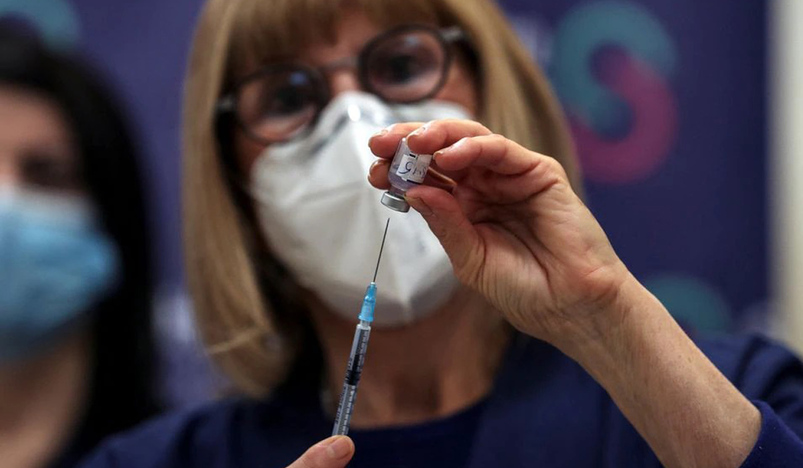
A nurse prepares a fourth dose of coronavirus disease (COVID-19) vaccine as part of a trial in Israel, as Health Ministry is considering offering the second booster to the elderly and immunocompromised, at Sheba Medical Center in Ramat Gan, Israel December 27, 2021.
An Israeli hospital administered fourth COVID-19 vaccine doses to a test group of health workerson Monday, in what it called the first major study into whether a second round of boosters will help contend with the fast-spreading Omicron variant.
Results of the trial, likely to be closely watched internationally, will be submitted to Israel's Health Ministry in about two weeks, said a spokesperson for Sheba Medical Centre near Tel Aviv.
Israel was the fastest country to roll out initial vaccinations a year ago, and became one of the first to launch a booster programme after observing that immunity waned over time.
With hospital admissions again climbing as Omicron spreads, a ministry expert panel last week recommended Israel become the first country to offer a second booster - initially to medical workers and those over 60 or with compromised immune systems.
The proposal was welcomed by the Israeli government, which has struggled against a plateauing of turn-out for vaccines. But the expert panel was divided over whether there is enough scientific data yet to justify fourth shots. Final approval by Health Ministry director-general Nachman Ash is still pending, and Israeli media say he may limit fourth shots to over 70s.
"The biggest question is, how significant is Omicron? It's clear to all that it is very contagious. But whether it causes very severe illness - that's the most significant question," said Gili Regev-Yochay, who is running the Sheba trial.
The Sheba study of 150 participants "will zero in on efficacy of the vaccine in producing antibodies, and safety, in order to ascertain if a fourth vaccine is needed in general", the hospital spokesperson said.
Hagai Levine, an epidemiologist, said more data is needed to gauge whether there has been a drop in protection against severe disease and death provided by the three shots offered so far.
"We can't blindly assume that another shot will solve it all, because it won't," said Levine, who heads Israel's Association of Public Health Physicians.
Some 63% of Israel's 9.4 million population have received the first two vaccine doses, according to ministry data. Almost 45% have taken a booster shot. Close to 2,000 confirmed or suspected Omicron cases have been logged and infections have risen sharply over the past week.
Prime Minister Naftali Bennett has been in self-isolation at home since Sunday after his 14-year-old daughter tested positive for COVID-19, with what his office says is probably the Omicron variant. He subsequently tested negative, and his office said on Monday he would continue to work from home.
Reporting by Rami Amichay, Dan Williams and Maayan Lubell; Editing by Jeffrey Heller and Peter Graff
SOURCE: REUTERS
.jpg)
Qatar Secures Place Among the World's Top 10 Wealthiest Nations
.jpg)
Hamad International Airport Witnesses Record Increase in Passenger Traffic

Saudi Arabia: Any visa holder can now perform Umrah

What are Qatar's Labour Laws on Annual Leave?
Leave a comment